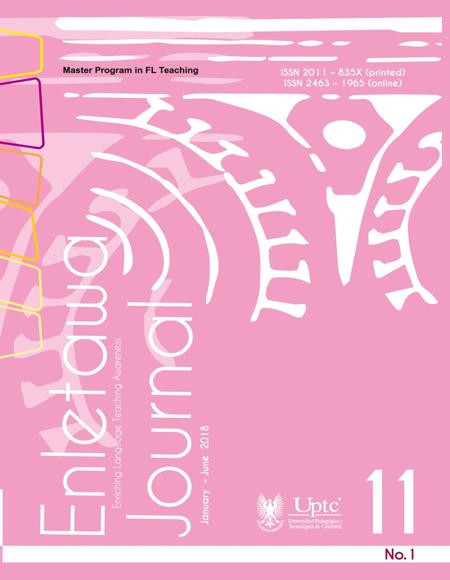Critical thinking development by using the implicit content of songs

Abstract
This study aimed to reveal the critical thinking development process of third English level students at a Languages Institute in a public University in Colombia when using the implicit content of songs through problem-based activities. A set of problem-based activities became the mechanism to achieve the prime goal of this study. The instruments from which the data was collected were video-recordings, focus group interviews and students’ artifacts. The findings revealed three main aspects according to the purpose of the research: the teacher must set up appropriate conditions to engage students in a critical thinking process, the participants’ critical thinking process can vary according to the different perspectives and activities implemented in the classroom and songs in university contexts can be used purposefully to activate thinking in the learning process.
Keywords
Songs, Critical Thinking, Problem-based learning
References
Barell, J. (2003). Developing More Curious Minds. Association for Supervision and Curriculum Development (ASCD). Alexandria, VA, USA.
Bell, J., and Waters, S. (2010). Doing your research project: A guide for first-time researchers in education, health and social science. England. McGraw Hill House.
Birjandi, P., and Bagherkazemi, M. (2010). The Relationship between Iranian EFL Teachers’ Critical Thinking Ability and their Professional Success. English Language Teaching 3 (2), 135.
Bogdan, R. C., and Biklen, S. K. (1998). Qualitative research in education: An introduction to theory and methods (3rd ed.). Needham Heights, MA: Allyn & Bacon.
Coghlan, D. (2004). Action Research in the Academy: Why and Whither? Reflections on the Changing Nature of Research 1. Irish Journal of Management 25 (2), 1.
Facione, P. (2013). Critical Thinking: What it is and why it counts. Retrieved from https://www.nyack.edu/ files/CT_What_Why_2013.pdf
Feldmand, D. (2009). Critical Thinking: Make Strategic decisions with confidence. USA: Azxo Press.
Fonseca, M., Toscano, C., and Wermke, K. (2011). Melodies that help: The Relation between Language Aptitude and Musical Intelligence. Anglistik International Journal of English Studies 22 (1), 101-118.
Freeman, D. (1990). Doing Teacher Research. Boston: Heinle & Heinle.
Halpern, D. (1998). Teaching critical thinking across domains: dispositions, skills, structure training, and metacognitive monitoring. American Psychologist 53 (4), 449–455.
Hill, K., and Robinson, N. (2003). Locomotion and literacy: Effective strategies to enhance literacy instruction. Retrieved from https://files.eric.ed.gov/ fulltext/ED474066.pdf
Hubbard, R., and Miller, B. (1999). Living the Questions: A Guide for Teachers Researchers. York, Maine: Stenhouse Publishers.
Iakovos, T. (2014). Critical and Creative Thinking in The English Language Classroom. International Journal of Humanities and Social Science 1 (8), 82-86.
Inskip, C., and MacFarlane, A. (2007). Meaning, communication, music: towards a revised communication model. Journal of Documentation, 64 (5), 687-706.
Kennedy, V. (2014). Critical, Cultural and Multimodal Approaches to Using Songs as Literature in Language Learning. Libri and Liberi 3 (2), 295-310.
Kendall, F. (1996). Diversity in the classroom: New approaches to the education of young children. New York: Teachers College Press.
Nurius, P. S. (1995). Critical thinking: A meta-skill for integrating practice and information technology training. Human Services in the Information Age, 109–126.
Paquette, K., and Rieg, S. (2008). Using Music to Support the Literacy Development of Young English Language Learners. Early Childhood Education Journal, 36 (3), 227-232.
Patton, M. (2002). Qualitative research & evaluation methods (3rd edn.). Thousand Oaks CA: Sage.
Pineda, C. (2003). Searching for Improved EFL Classroom Environments. The Role of Critical Thinking-related Tasks. Colciencias.
Puthikanon, N. (2010). Examining Critical Thinking and Language Use through the Use of Webquests in an EFL Reading Class. USA: Proquest Dissertation Publishing.
Richards, K. (2009). Trends in Qualitative research in language teaching since 2000. Language Teaching 42 (2), 1-35.
Tseng, M. (2008). Data-driven problem solving and students’ critical thinking in a problem based learning environment. ProQuest Dissertations and Theses.
Yuen, L (2011). A comparison of students’ reflective thinking across different years in a problem-based learning environment. Instructional Science 39, 171-188.